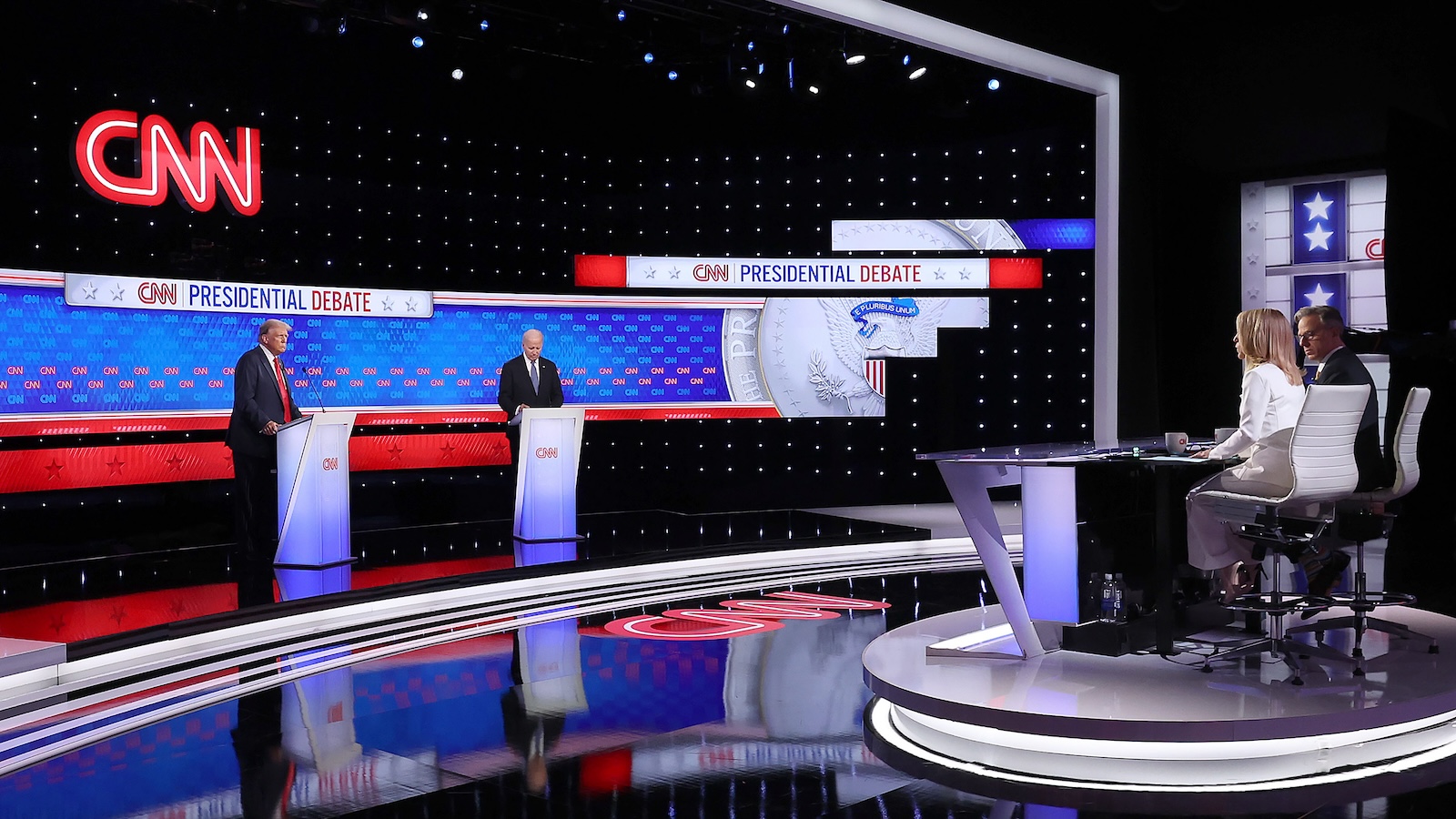Over more than an hour and a half of back-and-forth, climate change got just a couple minutes of airtime during a CNN-hosted debate between President Joe Biden and former president Donald Trump on Thursday.
It was the first time the men had faced each other on the debate stage since October 2020. Both candidates were reportedly eager for the confrontation, with Biden’s team seeking to warn voters about the increased radicalism that Trump is promising to bring to a second term, and Trump keen on digging into his rival’s alleged cognitive decline.
Most of the discourse focused on hot-button issues like immigration and the economy. Biden spoke with a raspy voice and at times tripped over his words, while Trump took many wild discursions and uttered several falsehoods that moderators Dana Bash and Jake Tapper did little to rein in.
A little over halfway in, however, Bash asked whether the candidates would do anything as president to address the climate crisis. Neither candidate directly answered the question, but Biden pointed to policies his administration has implemented to encourage the development of clean energy technologies. Trump gave an incoherent nonanswer.
“I want absolutely immaculate clean water and absolutely clean air,” Trump said. “And we had it. We had H2O, we had the best numbers ever, and we were using all forms of energy, everything.” He said his presidency saw “the best environmental numbers ever,” a statistic he said his advisers had given him moments before he walked onto the stage. In truth, Trump rolled back more than 200 environmental policies during his four years in office.
Trump also took credit for pulling the country out of the Paris Agreement — a “ripoff” for the U.S., as he described it. He otherwise used his allotted climate time to talk about his support among police groups and Biden’s border policies, among other unrelated topics.
Biden, for his part, said he enacted “the most extensive climate change legislation in history,” a reference to the 2022 Inflation Reduction Act, which contained $369 billion in clean energy tax credits and funding for climate and energy programs. He also mentioned his administration’s creation of the American Climate Corps — a federal program to put young people to work on landscape restoration, renewable energy deployment, and other green projects — and reiterated the importance of keeping global warming below 1.5 degrees Celsius (2.7 degrees Fahrenheit).
In combination with preexisting policies, the Inflation Reduction Act is expected to cut the country’s greenhouse gas emissions by up to 42 percent by 2030, almost within reach of the country’s commitment under the Paris Agreement to halve emissions compared to 2005 values by the end of the decade.
This is in marked contrast to projections about what could happen to the climate under a second Trump term. According to an analysis published in March by Carbon Brief, another Trump administration could add some 4 billion metric tons to U.S. greenhouse gas emissions by 2030, compared to a second Biden term. This increase could cause $900 billion in additional climate damages globally. The analysis predicted that, if Trump rolled back all of Biden’s key climate policies, the U.S. would be “all but guaranteed” to miss its 2030 climate target.
“Given the scale of U.S. emissions and its influence on the world, this makes the election crucial to hopes of limiting warming to 1.5 degrees Celsius,” Carbon Brief said.
Beyond the one question from Bash, the only other climate-related mentions during the debate came from Trump, who blamed the U.S.’s federal deficit on a failure to extract “the liquid gold right under our feet” — oil and gas — and referred to Biden’s climate policies as the “green new scam.” He also used the term “energy independent” to describe the nation on January 6, 2021, the day he told his supporters to launch an insurrection on the U.S. Capitol.
This is in line with some of the former president’s previous messaging about climate change, although it’s hard to parse what he actually believes from his history of erratic, conflicting statements. Sometimes he’s said climate change is a “hoax” orchestrated by China; other times he’s acknowledged its existence but questioned its connection to human activity.
More recently, Trump has downplayed the seriousness of the climate crisis. At a campaign rally in January, he called a youth climate protester “immature” and told her to “go home to mommy.” If elected, he has promised to “drill, baby, drill,” and reverse Biden administration climate policies like the Inflation Reduction Act.
Although expectations have never been particularly high about the prominence of climate change during a presidential debate, climate experts expressed disappointment in the brevity and shallowness of Thursday’s climate discussions. “More time discussing golf than climate. What a world we are living in,” tweeted Jeff Goodell, the author of The Heat Will Kill You First, referring to a bizarre exchange between the two candidates in which Biden challenged Trump to a round of golf.
Other observers shared deeper concerns about Biden’s performance, which included mistakes that his opponent was quick to point out.
“I hope he reviews his debate performance Thursday evening and withdraws from the race, throwing the choice of a Democratic nominee to the convention in August,” wrote the New York Times opinion columnist Nicholas Kristof.



